After Republic investigation, Gov. Katie Hobbs OKs new law to reform assisted living facilities
Cathy McDavid invited a journalist to her mother Joann’s celebration of life.
Family milled around a room at the funeral home filled with photographs of Joann, prints of her poetry and her paintings.
Her casket was open. Heavy makeup had covered bruises and the scar from a recent skin graft on her hand.
But McDavid wanted people outside that room to know about those bruises. She wanted those bruises to make a difference, to one day prevent other people from having similar wounds.
That’s why she called a journalist just days after her mother was beaten to death by a fellow resident at her memory care facility in north Phoenix, Bethesda Gardens.
Three years later — after she was featured in The Arizona Republic’s "The Bitter End" series, sent countless emails to elected officials and delivered testimonies at the statehouse — McDavid stood beside Gov. Katie Hobbs on Monday as she signed into law a bill that will significantly change assisted living and dementia care in Arizona.
McDavid said she felt her mother with her.
“Cathy — this is for your mom and all the other Arizonans who deserved better. Who went into these facilities seeking help, but received excuses and substandard care,” Hobbs said.
New law had broad bipartisan support
The new law, House Bill 2764 sponsored by Rep. Tim Dunn, R-Yuma, increases caps on fines for facilities that endanger residents and requires the health department to come up with memory care standards for facilities licensed to serve residents who need the most help, among other provisions.
Caregivers serving those residents will have to complete eight hours of initial dementia-care training, up from four. They'll also have to receive four more hours annually, though the bill does not specify whether the cost of that continued education will fall upon providers or individual employees.
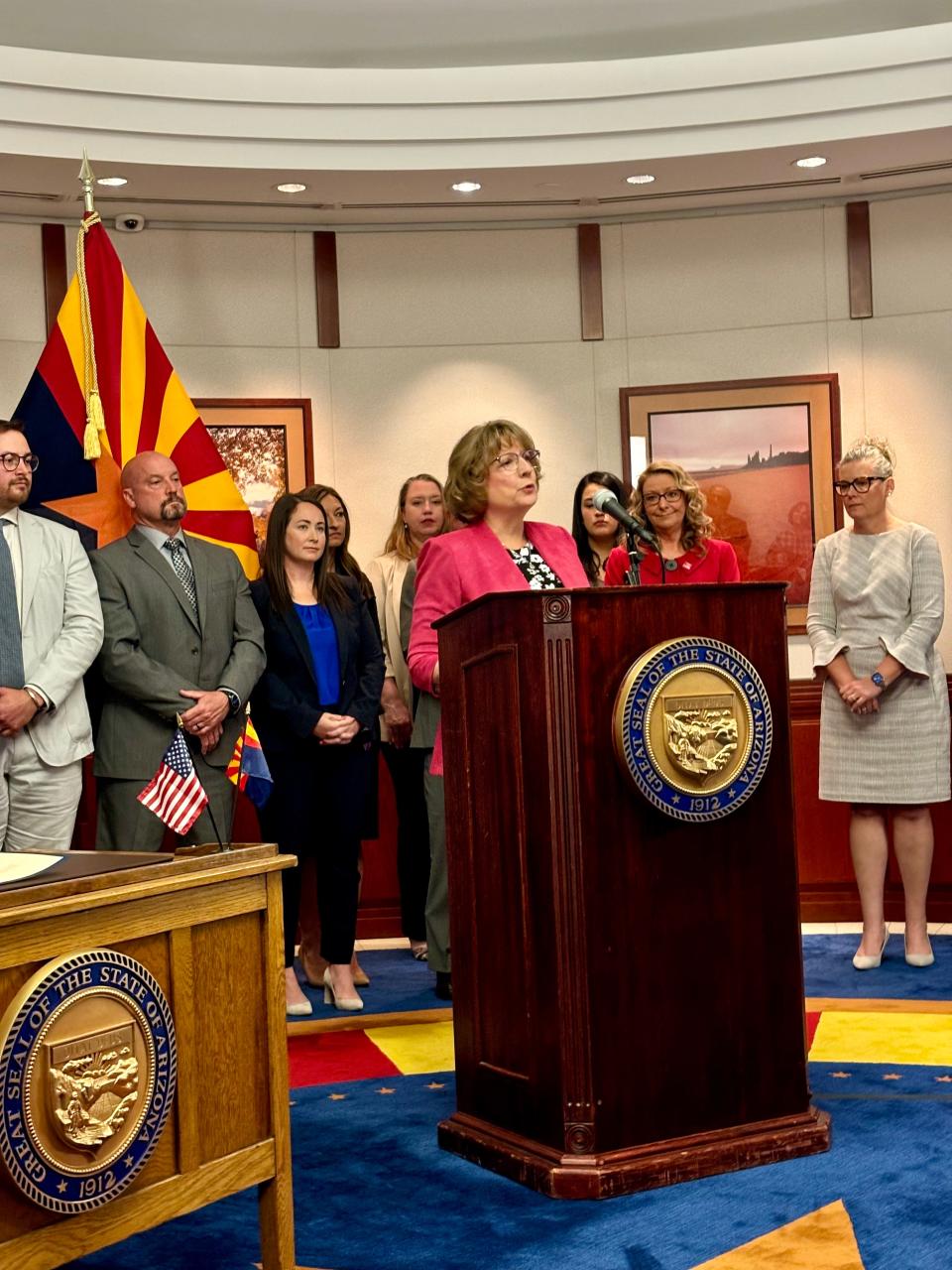
Dunn’s bill received bipartisan support throughout at the Legislature, passing a final vote in the state House of Representatives 59-0 on April 4.
“This rarely happens in the current political climate,” Dana Kennedy, Arizona state director of AARP, said at the bill signing. “This has never been a partisan issue. This is a significant piece of legislation aimed at enhancing the safety, oversight and quality of long term care across Arizona.”
Unlike nursing homes that are federally regulated, assisted living facilities are regulated by the states where they operate.
Standards vary: At least 20 states do not have any additional licensing requirements for "memory care” but people pay more money for it, according to a 2022 Arizona Republic survey of state policies.
Arizona’s law stopped short of requiring special memory care licenses — the original proposal for that was nixed. But it does require the health department to establish standards defining memory care.
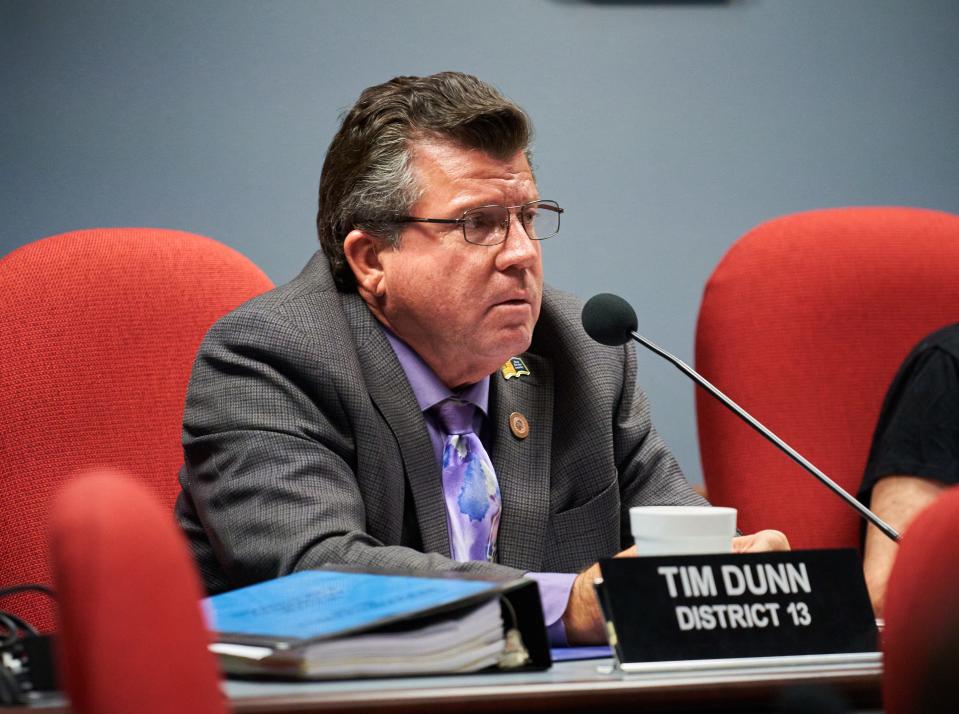
“Creating new and meaningful care standards for people living with dementia in assisted living residences in Arizona is sorely needed,” Eilon Caspi, a researcher at the University of Connecticut with a doctorate in gerontology, wrote in an email.
“All too often the term ‘memory care’ is used for marketing purposes. It is often misleading the public as it creates the illusion of specialized dementia care. What it means in reality varies greatly across assisted living providers.”
Many states also require too few dementia-care training hours per expert recommendations, which call for at least six hours, according to the Washington Post. Arizona was one of them – but the new law brings the state in line with the few that require more than six hours.
Arizona still is behind California, which requires 12 hours of dementia care training, and Maine, which requires 16 hours for dementia unit caregivers, according to the Washington Post.
Caspi said the expanded training requirements in Arizona are a first step, but that eight hours of training is “far from enough.”
Catch up: At an Arizona senior living center, a resident killed another. How the system enables violence
“Eight hours is better than four,” he said. “But eight is far from where you need to to be if you’re really expecting people to provide care — dignified, safe care.”
Parts of the law, including heftier fines for violations, take effect 90 days after the legislative session ends this year. Some sections of the law, such as compliance with training requirements, will take effect in 2025.
Reforms are long time coming
Kennedy called the new law “a great start” that puts Arizona at the forefront for state assisted living regulations.
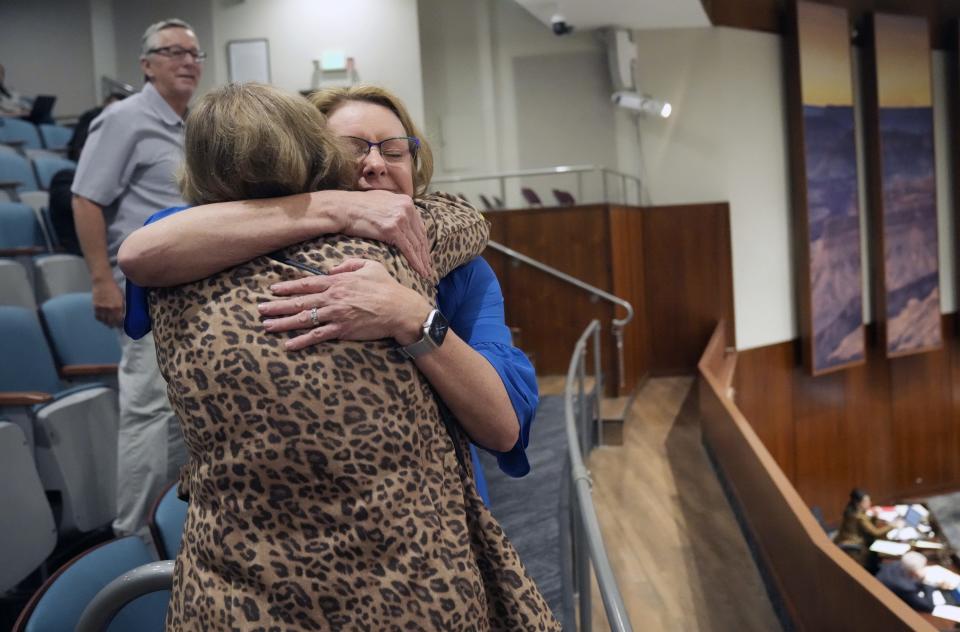
Kennedy said the new law is the culmination of years of discussing assisted living reforms that started in 2018, when news broke that a caregiver at Hacienda Healthcare in Phoenix impregnated a woman with intellectual disabilities.
Employees did not know the woman was pregnant until she started giving birth.
Then-House Speaker Rusty Bowers formed a committee to hash out potential reforms. But shortly thereafter the pandemic shifted the focus to the COVID-19 response, Kennedy said.
A few years later, The Republic and azcentral.com began investigating memory care facilities, prompted by the death of McDavid’s mother. Reporters published the first part of their series, "The Bitter End," in spring 2023 chronicling widespread injuries and death in assisted living facilities around the state.
Reporters followed with several other investigative articles throughout the year, including one about a woman who killed her roommate after her caregivers skipped her medication and another about sexual assault in facilities.
The series, Kennedy said, moved the needle. Suddenly her organization was seeing more enthusiasm from lawmakers and the Governor’s Office to change the system than they’d ever seen.
Dunn sponsored the bill that ensures “transparency, safety and quality care” for all residents and AARP Arizona had its members make hundreds of phone calls to lawmakers asking them to support the measure, Kennedy said.
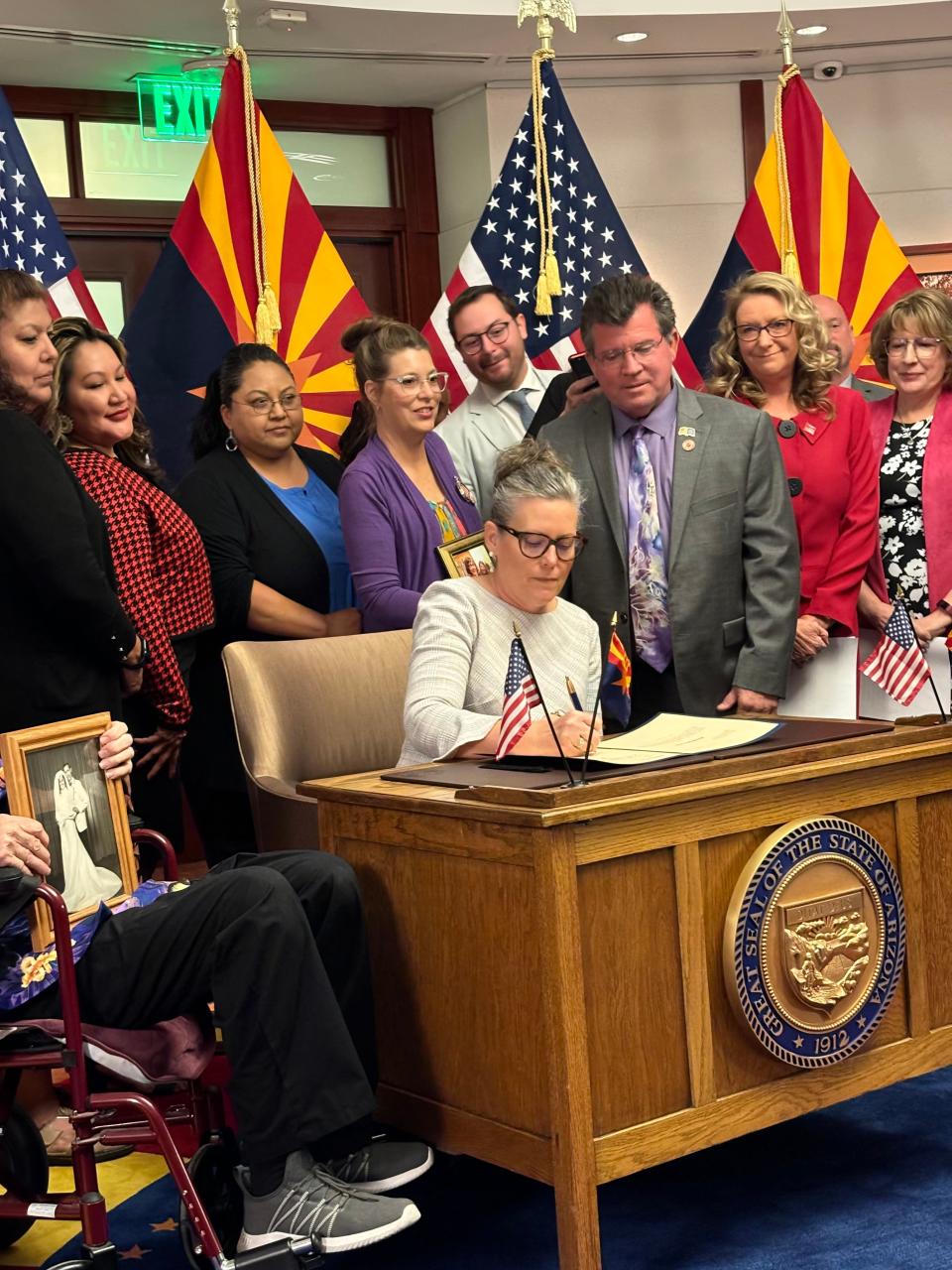
They hit the phones hard the week of the final vote.
Those calls appear to have worked. Ten house representatives had originally opposed the bill but changed their minds the day of the final vote.
“It is our hope that when a loved one moves into a long term care facility that their loved ones are able to rest at night,” Kennedy said during the bill signing.
More reforms could come in future years
Hobbs announced senior living reform as a top priority during her State of the State speech in January. A few of Hobbs' wishes did not land in Dunn’s bill, such as standardizing assisted living inspections and ensuring facilities can’t hide or erase their violation history.
The state’s search engine for facility citations is not intuitive and some violations can appear hidden from a basic search for facilities that change their license. The Republic built a replacement tool that allows consumers to more easily research facilities.
The Republic's comprehensive tool: What Arizona assisted living centers facilities had citations? See The Republic's comprehensive tool
Jennie Cunico, who leads the Arizona Department of Health Services, said during the bill signing that her team is working to improve that system.
When asked which of her priorities didn’t make the cut this session and what she’d like to see next year, Hobbs stepped aside to let Dunn answer.
Dunn pointed to a 25-person study committee that the law creates, which could iron out more reforms particularly having to do with staffing. He said he didn't include staff-to-resident ratios in his bill because "we couldn't get agreement when we first started."
The law signed Thursday was one of two bills introduced this session that aimed to reshape the rules governing Arizona senior care facilities.
The other bill, which was sponsored by Rep. Quang Nguyen, R-Prescott Valley, would have allowed residents and their families to put cameras in residents’ rooms. It was blocked in the Senate last month.
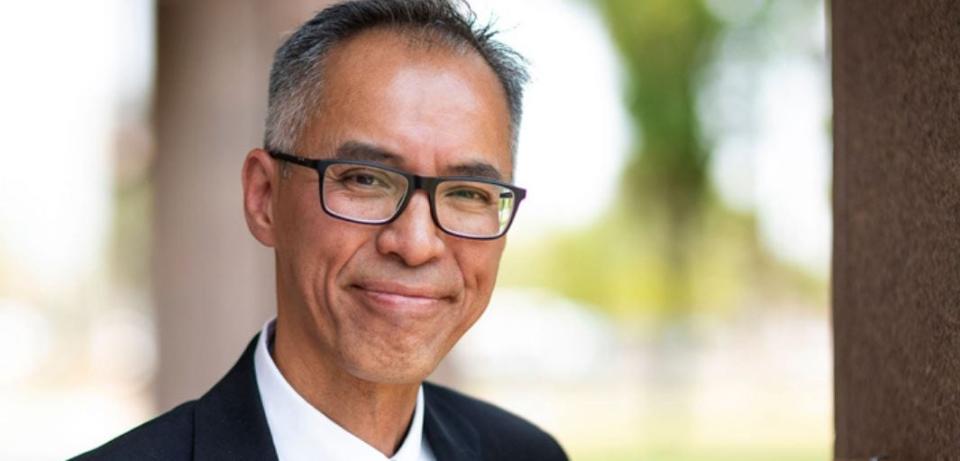
A provision requiring facilities to verify that current and prospective employees aren’t on the Arizona Adult Protective Services registry is the most significant part of Nguyen’s bill that survives in the new law.
“We wanted to make sure — as complex as this bill was — what was the low hanging fruit that we could get to ... Gov. Hobbs that was actually going to move us forward in a historic manner,” Dunn said at the signing. “And that's what we did.”
Caspi said the bill is a first step, but Arizona still has far to go for vulnerable seniors with dementia to receive the best care possible.
Several provisions in the law signed Monday rely upon the state Health Department for implementation and enforcement. For example, though the law requires that the Health Department create standards for memory care in facilities that can serve residents with the most needs, it does not outline what those standards should be.
But the Health Department’s track record in long term care oversight is blemished: The agency has come under fire from the Arizona Auditor General several times in the past few years for neglecting to respond to complaints in nursing homes.
More on the story: Arizona senior living center where resident killed roommate has had nearly 150 citations since
Rep. Matt Gress, R-Phoenix, said during a Feb. 15 committee hearing that the reforms are “desperately needed” but he questioned the state health department’s ability to carry them out.
“There’s just been a failure at the department for a number of years,” Gress said. “And I want to feel like we’re passing legislation that is going to be implemented appropriately."
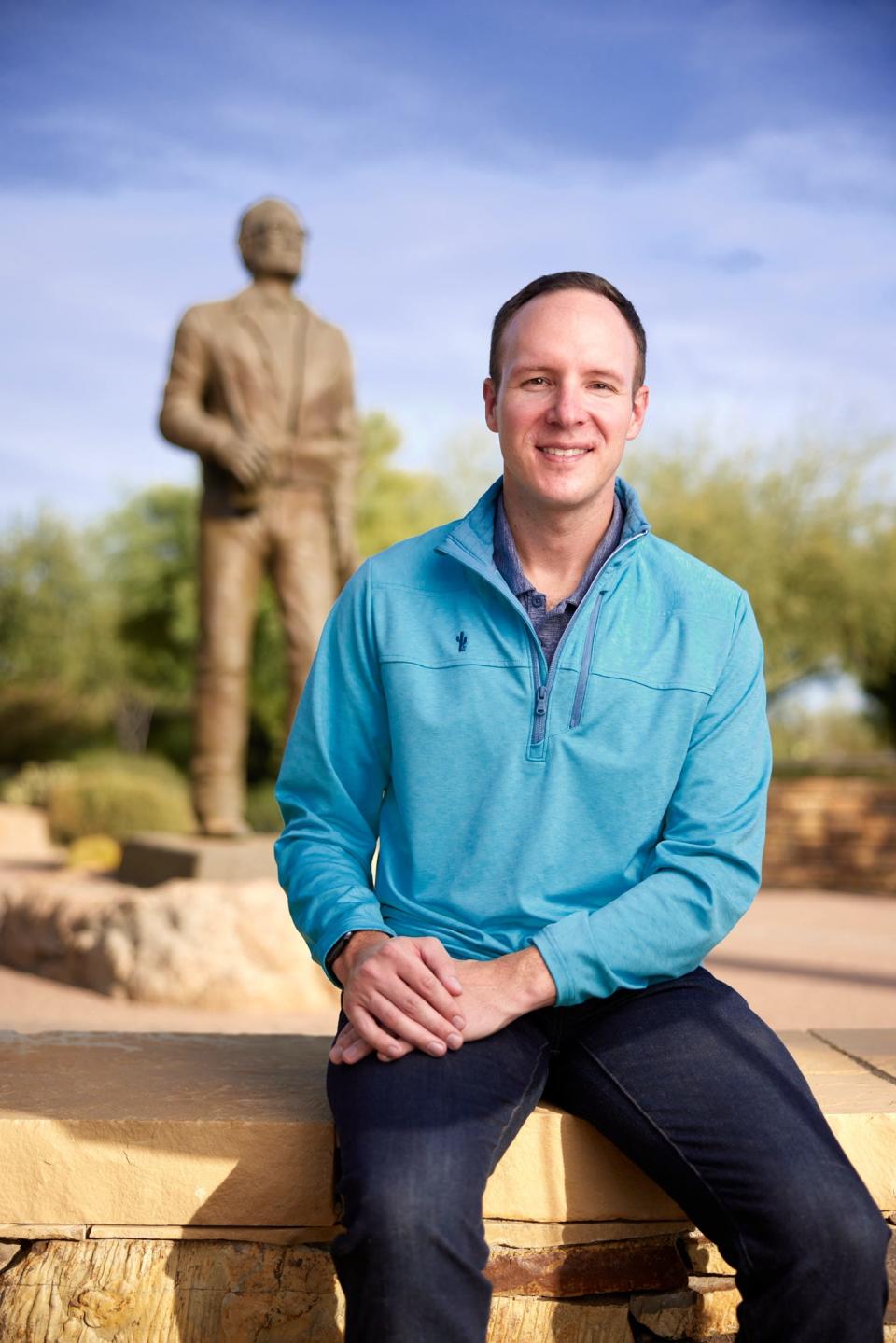
A 2019 audit found that the state Health Department either took too long to investigate nursing home complaints or didn't investigate them at all.
A follow-up report published last year said the agency had stopped closing complaints without going onsite. But it pointed out that continued problems with timely investigations “may put long-term care facility residents’ health, safety, and welfare at risk.”
Brian Kaskie, a professor of health policy at the University of Iowa who has a doctorate in gerontology and public policy, cautioned that reforms may not be as effective if the agency doing the monitoring and the enforcement — the Health Department, in Arizona's case — isn't well-resourced or well-functioning.
“If that’s a dead head office, right, then who cares if they’re $1,000 fines or $10,000 fines?” Kaskie said.
Kennedy, who has worked for long term care reform in Arizona for more than a decade, said she and AARP won’t stop fighting for change “until we know that all of our residents in long term care facilities, as well as the staff that work in them, have the tools to make sure that they can do the best job that they can.”
She said she hopes to bring the contentious provision allowing families to put cameras in resident’s rooms back next year.
“Anybody who knows me, I’m an endurance athlete,” Kennedy said in an interview. She’s completed three full distance — and about 20 half distance — Ironman triathlons. There’s a tattoo on her ankle commemorating her determination. “I kind of look at public policy as being an endurance athlete, and you have to keep getting up every single day and keep training, keep learning, keep talking to people, take ideas and suggestions and move forward.”
Advocates and the families of residents said Monday’s bill signing represented a victory for Arizona seniors.
“Today, we've done right by improving the quality of life for our loved ones residing in facilities, and taking strides to keep them safe,” McDavid said in a speech at the signing.
“I thank Gov. Hobbs for her support, and everyone who had a part in helping me keep my promises to my mother.”
Reach Sahana Jayaraman at Sahana.Jayaraman@gannett.com. Follow her on X, formerly Twitter, @SahanaJayaraman.
Reach Caitlin McGlade at caitlin.mcglade@arizonarepublic.com. Follow her on X, formerly Twitter, @caitmcglade.
This article originally appeared on Arizona Republic: Arizona Gov. Katie Hobbs signs bill to reform assisted living rules

